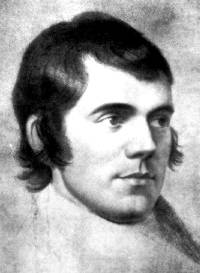Information copied from: Historic UK - The History and Accommodation Guide @ www.historic-uk.com
Robert ‘Rabbie’ Burns
by Ben Johnson
Robert Burns is the best loved Scottish poet, admired not only for his verse and great love-songs, but also for his character, his high spirits, ‘kirk-defying’, hard drinking and womanising! He came to fame as a poet when he was 27 years old, and his lifestyle of wine, women and song made him famous all over Scotland.
He was the son of a farmer, born in a cottage built by his father, in Alloway in Ayr. This cottage is now a museum, dedicated to Burns.
As a boy, he always loved stories of the supernatural, told to him by an old widow who sometimes helped out on his fathers’ farm and when Burns reached adulthood, he turned many of these stories into poems.
After the death of his father in 1784, Burns inherited the farm but by 1786 he was in terrible financial difficulties: the farm was not successful and he had made two women pregnant. Burns decided to emigrate to Jamaica so to raise the money required for this journey, he published his ‘Poems in the Scottish Dialect’ in 1786, which was an immediate success. He was persuaded not to leave Scotland by Dr Thomas Blacklock and in 1787 an Edinburgh edition of the poems was published.
He married Jean Armour in 1788 – she had been one of his many women during his early life. A very forgiving wife, she accepted and took responsibility for all Burns’ children, legitimate and illegitimate alike. His eldest child, the first of three illegitimate daughters all called Elizabeth, was greeted with the poem ‘Welcome to a Bastard Wean’.
A farm was bought, Ellisland, on the banks of the River Nith near Dumfries, but unfortunately the farm did not prosper and Burns ceased farming in 1791 and became a full-time exciseman.
A problem soon arose as the steady income from this employment gave him ample opportunity to continue with his hard drinking which had long been his weakness.
One of the most important literary tasks he began (a labour of love as he did not receive any payment for the work) was his songs for the Scots Musical Museum. Burns contributed over 300 songs, many of his own composition, and others based on older verses.
 At this time he wrote, in just one day, his most famous long poem, ‘Tam O’Shanter’. ‘Tam O’Shanter’ is the story of a man who disturbs a coven of witches in the kirk at Alloway and has to flee for his life on Meg, his old grey mare. The fastest witch, Cutty Sark (cutty sark means short petticoat) nearly catches him by the River Doon, but the running water makes her powerless and though she manages to grasp Meg’s tail, Tam escapes over the bridge.
At this time he wrote, in just one day, his most famous long poem, ‘Tam O’Shanter’. ‘Tam O’Shanter’ is the story of a man who disturbs a coven of witches in the kirk at Alloway and has to flee for his life on Meg, his old grey mare. The fastest witch, Cutty Sark (cutty sark means short petticoat) nearly catches him by the River Doon, but the running water makes her powerless and though she manages to grasp Meg’s tail, Tam escapes over the bridge.
Burns died aged 37 of rheumatic fever which he contracted after falling asleep at the roadside (after a particularly vigorous drinking session) in pouring rain. The last of Burns’ children was actually born during his funeral service.
Burns will never be forgotten as his poems and songs are still as popular in Scotland as they were when first written.
Burns Night is a great occasion on January 25th when many dinners dedicated to his memory are held all over the world. The ritual of the Burns Supper was started by close friends of Robert Burns a few years after his death and the format remains largely unchanged today, beginning with the chairman of the Supper inviting the assembled company to welcome in the haggis. The poem ‘To a Haggis’ is recited and the haggis is then toasted with a glass of whisky. The evening ends with a rousing rendition of ‘Auld Lang Syne’.
His spirit lives on!
No comments:
Post a Comment